Matthew Dicks's Blog, page 481
March 6, 2013
Do you know anyone who smokes?
As Connecticut debates a ban on smoking in cars with children, The Daily Beast offers a list of establishments where smoking is still permitted.
I’m frankly stunned that any of these places still exist.
I’m even more surprised that young people continue to start such an expensive, destructive and stigmatizing habit.
I know a lot of people. I am blessed with many friends.
I don’t know a single person who smokes.
I see smokers all the time, standing outside buildings, sitting on park benches and walking the golf course, but I can’t think of anyone who I know personally who smokes.
Not one.
This leads me to wonder:
Has there been a self-imposed segregation of smokers and nonsmokers in this country?
Less than 20% of Americans smoke. Has this ever-shrinking percentage of the population hunkered down into tiny smoking enclaves? Have they formed small tribes of nicotine-stained addicts who isolate themselves from the general population when it comes to social interaction? Is there any social circle in America that contains a true blend of smokers and nonsmokers?
Or am I simply an outlier? Is it strange that I don’t know any smokers on a personal level?
Odds would seem to indicate that better than 1 in 6 of the people who I know are smokers, but if you asked me to find three people whose names I know who also smoke, I don’t think I could find more than one.
Is this normal?
More importantly, what does it say about the socially isolating nature of smoking?
If I want to convince a teenager not to smoke, should I focus on the health risks, or should I simply explain that smoking reduces the potential of your social circle by more than 80%?
For a teenager, a reduction of that size in potential friends and dates might actually seem more menacing.
March 5, 2013
Grandfather-in-training
My father–in-law does his best to keep me informed on national politics, foreign policy and the dangers of playing tackle football, but what he teaches me best is how to be a good grandfather.
If my future grandchildren love me half as much as my daughter loves him, I will have learned his lessons well.
No two snowflakes (or cows) are alike is bunk
I read this week that all cows have different patterns of spots and “not a single cow has identical spots to another.”
I’ve also been repeatedly told that no two snowflakes are ever alike.
How can anyone say this with certainty?
Do you have any idea how many cows are alive on the Earth at this moment?
The International Erosion Control Association, which tracks overgrazing, estimated the number at 1.53 billion in 2001.
With more than a billions cows alive on this planet at any one time, am I expected to believe that the chances of two cows having identical patterns of spots is zero?
If we factor in all the cows that have ever lived, the statement becomes absurd.
But the snowflake argument is even worse. It has snowed on this planet for billions of years. Trillions of snowstorms producing an average of 5.2 quintillion snowflakes each time.
And I really expected to believe that no two snowflakes have ever been alike in all that time?
Let’s put an end to the snowflake madness. Please?
March 4, 2013
Call me an imbecile all you want. Just leave these particular fathers alone, lest we hurt their feelings and make them cry.
Apparently there are fathers in the world who don’t like to be perceived as bumbling fools.
From a New York Times piece on the issue:
The hapless, bumbling father is a stock character in product marketing. He makes breakfast for dinner and is incapable of handling, or sometimes even noticing, a soggy diaper. He tries desperately to hide the crumb-strewn, dirt-streaked evidence of his poor parenting before the mother gets home.
This is an image that many fathers who attended the Dad 2.0 Summit — a meeting of so-called daddy bloggers and the marketers who want to reach them — have come to revile. They are proud to be involved in domestic life and do not want to serve as the comic foil to the super competent mother.
I suspect the real problem here is that the fathers attending the Dad 2.0 Summit are lacking self worth and humility. Basically, these men are being made to feel bad by commercials that portray them as bumbling fools.
First, we are all bumbling fools from time to time. Men and women alike. Embrace it. Revel in it. Self deprecation is a beautiful thing. Make the world a better place. Be the clown.
I was in the supermarket yesterday, looking for a “heavy mango” and a “ripe avocado.” Could I have handled this mission on my own?
Possibly.
But instead I asked two different women to help, explaining to each that I was likely to screw things up if left to my own devices.
My wife once sent me to the supermarket for a mango and I came home with a papaya. We didn’t even know it was a papaya until we took a photo of it and asked the readers of my blog to help us identify it.
There’s nothing wrong with being the bumbling fool from time to time. There’s even less wrong with pretending to be the bumbling fool if it means getting a little assistance when needed.
More importantly, if a commercial is capable of making you feel bad about yourself, the problem is not with the commercial but with you. Who cares how a laundry detergent commercial portrays a father in an effort to sell more soap? It doesn’t effect me. I know who I am, and more importantly, I know what kind of father I am. Happily, I am incapable of being threatened or harmed by a 30-second commercial, and I would like to suggest that the fathers at the Dad 2.0 Summit embrace the same mental framework (but only after changing the ridiculous name of their conference).
If these men were ten years old, their complaints would sound something like this:
“No fair! The Campbell’s Soup Company is making that mommy look super smart and making that daddy look silly and dumb! That hurts my feelings! Tell them to stop!”
As adults, they instead choose to gather for a conference at a hotel, assign their conference a “2.0” moniker in order to sound forward thinking and then self-importantly label the whole thing as a “summit,” which according to Webster’s Dictionary is “a conference of highest-level officials,” which this is definitely not.
Grow up, gentlemen. If you find the image of a super competent mother threatening, the problem is not with the advertiser but with you.
Some things are better left unsaid
“Goodbye, you interesting looking poopie!”
I wish she wouldn’t describe everything that goes on in the bathroom.
March 3, 2013
I abandoned the Catholic Church at the age of seven. Credit my Catholic mother.
Paul Elie, a senior fellow in the Berkley Center for Religion, Peace and World Affairs at Georgetown, suggests in the New York Times this week that Catholics (of which he is one) give up their faith as a form of protest against the recent practices of their church.
Resignation: that’s what American Catholics are feeling about our faith. We are resigned to the fact that so much in the Roman Catholic Church is broken and won’t be fixed anytime soon.
So if the pope can resign, we can, too. We should give up Catholicism en masse, if only for a time.
He goes on to explain his rationale:
For the Catholic Church, it has been “all bad news, all the time” since Benedict took office in 2005: a papal insult to Muslims; a papal embrace of a Holocaust denier; molesting by priests and cover-ups by their superiors. When the Scottish cardinal Keith O’Brien resigned on Monday amid reports of “inappropriate” conduct toward priests in the 1980s, the routine was wearingly familiar. It’s enough to make any Catholic yearn to leave the whole mess for someone else to clean up.
In response to these crimes, scandals and missteps, Elie goes on to list a variety of churches that he will be attending in the near future, none of which are Catholic.
As much as you can be born into a religion (a phrase which really means that your parents chose to indoctrinate you into their belief system regardless of what might be in your heart), I was born into Catholicism. While my mother wasn’t an overly observant Catholic, the church services that we occasionally attended were Catholic and the church that we identified as our own was the same. I never liked going to church, but it never occurred to me at the time that there might be another, more appropriate religion for me.
That’s how indoctrination works.
Our secret sauce is right. Everyone else’s secret sauce is wrong. Don’t even bother tasting it.
Then my mother sent me to my first CCD class when I was about seven years-old. It was a two-hour affair conducted in the middle school adjacent to our church.
When I returned home from CCD two hours later, I told my mother that I was not going back. Also, I was no longer a Catholic.
My objections to Catholicism centered on my resistance to hierarchy and authority. Even at the tender age of seven, I was a difficult person who did not like being told what to do. While I was able to stomach the tenets of Catholicism for an occasional Sunday service, CCD made it clear to me that the church was a top-down, authoritative institution where the questioning of religious doctrine and practice was not permitted.
I also couldn’t stand the thought of more school on Thursday afternoons.
To my mother’s credit, she allowed me to abandon Catholicism with the agreement that I would choose a new church. “You don’t have to be Catholic,” she said. “But you have to be something.”
Over the course of the next few weeks, my mother brought me to a variety of churches, and I ultimately settled on a Protestant Congregationalist Church in town. It was a simple, white church on a hill that served Wonder Bread and grape juice for communion and allowed children to ring the bell signaling that church was about to begin. Best of all, in the middle of Sunday service, the minister would call the children down to the front of the church and sit on the dusty floor with us, telling us a story while ignoring the adults.
That sealed the deal for me.
I have openly questioned many of the decisions that my parents made throughout my childhood, but this was one of the best decisions my mother ever made. Remarkably selfless, too. How many parents do you know who would be willing to release their children from their own belief system in favor of one that better accommodates their own personal style or beliefs?
I don’t know if I know any.
When it comes to religion, parents tend to exceptionally selfish and illogical, thinking of religion as a winter coat.
“Put it on. It’s cold outside. You need it.”
But religion is not something that can be put upon your child without a blend of indoctrination, deception and coercion. Expecting your child to willingly accept your belief system is ridiculous.
My mother knew this. She honored me as an individual. She respected by personal belief system.
Admittedly, religion didn’t stick with me, but I suspect that it wasn’t going to stick regardless of what my mother did.
My mother probably knew this, too.
I am a reluctant atheist today. I would desperately like to believe in the existence of God (though not the cruel, inhumane God from the Old Testament) and an afterlife , but I simply haven’t found myself able to do so.
I suspect that I’m a little too logical, a little too oppositional and too much of a nonconformist to accept the dogma of any organized religion, regardless of what I may want to believe.
But I cherish those days spent in that Congregational church in Blackstone, Massachusetts. I didn’t come away with a belief in God or church doctrine, but I read the Bible from cover to cover at least twice while sitting in those wooden pews (probably the source of my disbelief), and think the church taught me a great deal about right and wrong. I suspect that I probably learned quite a bit about teaching and storytelling from a minister who knew how to entertain and educate a handful of kids ages 5-15 every week without exception.
That was real miracle.
Best moment
My daughter ran up to me and said, “Dad, can I have you?”
“Have me what?” I asked.
“In my arms!”
Nothing in life has made me happier.
March 2, 2013
Future game show host?
I would never presume to tell my daughter what to do with her life. She can pursue whatever career she’d like, and I will support her every step of the way.
That said, her sudden inclination toward game show host is disconcerting.
Nineteenth century women did some insane things in the pursuit of beauty. But the modern woman is a hell of a lot crazier.
Mental Floss lists 11 Really Terrible 19th-Century Beauty Tips. They include:
Bathe in ammonia.
Don’t wash your face, hands or hair.
Dash soapsuds into your eyes to keep them clean.
Sit naked by the window in order to absorb sunlight and “vapor bathe.”
Keep your eyelashes trimmed daily.
Strange, yes. But are they any more strange than today’s female beauty tips, which include:
Change the color of your eyelids to shades of pink or green.
Install bags of saline in your breasts to enhance their size.
Cook your skin to a shade of brown via cancerous ultraviolet radiation.
Undergo a process in which dermalogen is taken from your skin and is transformed into a into a high concentration collagen slurry that is injected into your lips to make enhance their size.
Don shoes with heels that will permanently damage your feet over the course of a lifetime.
Burn your hair daily until it is sufficiently straight.
I admire my wife for many reasons, but one is her rejection of the trappings of the beauty industry.
She does so little in the pursuit of beauty and looks so damn good.
March 1, 2013
The future of publishing
When it comes to the future of publishing, I want it on the record that my wife and I are doing our jobs to ensure the existence of future readers.

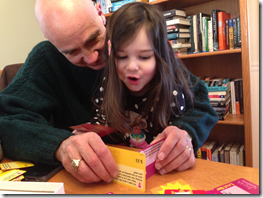
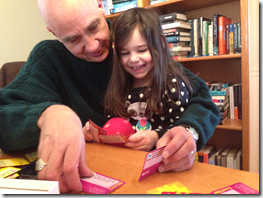
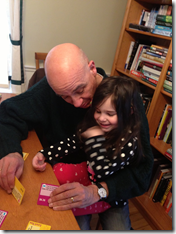
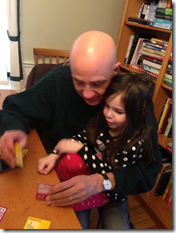
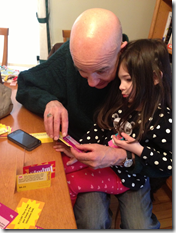






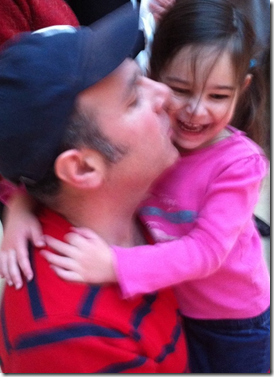
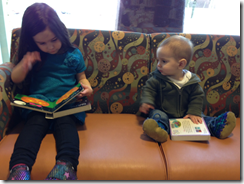
![image_thumb[1]](https://i.gr-assets.com/images/S/compressed.photo.goodreads.com/hostedimages/1419299389i/13030727.png)
![image_thumb[2]](https://i.gr-assets.com/images/S/compressed.photo.goodreads.com/hostedimages/1419299389i/13030728.png)
![image_thumb[3]](https://i.gr-assets.com/images/S/compressed.photo.goodreads.com/hostedimages/1419299389i/13030729.png)


